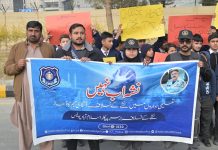By Ajmal Khan Yousafzai
ISLAMABAD: While attending the Webinar on “CPEC Phase ll: China-Pakistan Industrial Cooperation”, the Chinese Consul General in
Karachi Li Bijian stressed the importance of favorable investment policies and well-developed infrastructure and facilities for Pakistan to attract foreign investments and cushion the adverse impact of the COVID-19 pandemic.
Organized by the Institute of Peace and Diplomatic Studies, Centre for BRI and China Studies in collaboration with Riphah International University, the Webinar provided a platform for government officials, businessmen and scholars to exchange their views on the current status of China-Pakistan industrial cooperation and the prospect; the difficulties and challenges
ahead; policies and implementation.
Director General China, the Foreign Ministry of Pakistan Mudassir Tipu; Former Pakistani Ambassador to China Masood Khalid; Prof. Mi Hong from Zhejiang University, Project Director of CPEC Liaqat Ali Shah, and over 70 celebrities from both Pakistan and China attended the Webinar. According to Gwadar Pro, Li reiterated that as the first phase of CPEC has laid a solid foundation for the economic development of Pakistan, the second phase endeavors to boost development in agriculture, industrial cooperation, and people’s livelihood.
However, the rampant COVID-19 pandemic has in some degree hindered the implementation of CPEC projects because of raw materials shortage caused by interruption to supply chains, inadequate labor force, and the subsequent delay of the project schedule. In this condition, Li suggested the government of Pakistan should take a far-sighted view and adopt top-down measures to meet the current challenges.
‘Extremism more dangerous for society than coronavirus’
ISLAMABAD: Speakers at a virtual seminar here on Tuesday maintained that the ‘virus of extremism’ is more dangerous for the society than coronavirus.
The webinar titled ‘Dukhtaran-e-Pakistan: Role of Women in Defeating the
Virus of Extremism’ was organized by the Women University Swabi. The event aimed at highlighting the role women can play and the responsibilities they
have to fulfil to fight the challenges of growing extremism, intolerance and cyberterrorism in the society in the present circumstances. In the first session of the workshop, trainer Asfand Ousaf told the participants that the ‘virus of extremism’ is more dangerous than coronavirus as extremist organizations and anti-state elements are using this crisis as an opportunity to launch a propaganda campaign in order to promote their vested interests. He said such elements are trying to entrap people by promoting specific ideologies on social media.
Asfand Ousaf said thousands of women from Europe and North Africa have voluntarily joined the ranks of such anti-state extremist elements in the past few years after getting inspired by their propaganda material available on social media and the internet.
He said several of those women also got married with the terrorists and were named as ‘Jehadi Brides’ by such elements. In the second part of the workshop, psychiatrist Mahnoor Laila threw light on the role woman and teachers can play in countering and preventing extremism. – Agencies






